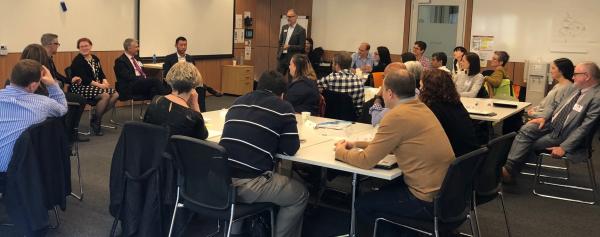






October 2018

As I was preparing to attend the World Cancer Congress last week I was struck by the authenticity and relevance of a speech happening at another world forum. Making her debut at the UN General Assembly, New Zealand Prime Minister Jacinda Ardern called upon world leaders to recommit to gender equality, saying that whilst gains have been made domestically, internationally other women and girls experience a lack of the most basic opportunities and dignity. She called upon the ‘power and the potential that resides here’ and urged members of the General Assembly to take immediate, decisive action on several fronts. For New Zealand, she said, ‘going alone is not an option’.
The 2018 World Cancer Congress was held for the first time in South East Asia, 1-4 October and with the emphasis again on our region, I couldn’t help thinking how Prime Minister Ardern’s observations could be so readily applied to the VCCC in relation to regional responsibility and gender and organisational parity. These themes were amplified by Professor Sanchia Aranda, President, Union for International Cancer Control (UICC) and CEO Cancer Council Australia as she welcomed participants to the Congress and highlighted the focus on topics addressing the rising divide between haves and have nots. With large and small countries from across the globe represented, many of the sessions focused on parity in cancer prevention and treatment with poorer nations highlighting the impact of poverty – and the impact on women in particular. This was made so powerfully clear by the President Elect of the UICC, Her Royal Highness Princess Dina Mered of Jordan who reminded us all “a woman dies every 2 minutes from cervical cancer”.
Connection, influence and innovation are powerful human attributes. Whilst global imperatives drive us, it is the individual commitment to leadership in our own domains, embracing authenticity, parity and good governance that should act as a guiding light when we seek to drive transformational projects.
The connection and influence each of us has as cancer advocates, researchers, educators and clinicians come with significant responsibility. We all must take heed of the importance of transparency in disclosing our competing interests and potential conflicts of interest. Professor José Baselga recently resigned from one of the world’s leading cancer centres - Memorial Sloan Kettering Cancer Center in New York where he was the chief medical officer. Professor Baselga has made seminal contributions to developing novel therapies for cancer using cutting edge translational biology to study tumour material from patients undergoing treatment with targeted therapies. However, as reported in the New York Times he failed to disclose potential conflicts of interests in many talks and publications. It is vital that we all be fully transparent in our financial and other competing interests to embed a culture of trust across the cancer and broader community. Myself and other leaders across the VCCC are always available to provide advice on these important matters.
During September, the first stage of the VCCC’s Leadership Development Program 2018 was held at Melbourne Business School with participation from all partners and including regional and consumer representation. This year, 23 leaders challenged themselves to think differently and explore how to get the most out of leading in a collaborative environment. From my observations, there was a real sense of positivity and shared purpose among the group. I am confident the participants will take fresh perspectives and new ways of working back to their respective organisations.
I was thrilled to learn of the news this week that Jim Allison from the University of Texas’s MD Anderson Cancer Center in Houston was jointly awarded the Nobel Prize in Physiology or Medicine with Tasuku Honjo for their work in cancer immunotherapies. Jim has a close association with many researchers in Victoria and I was privileged to introduce him to one of my own patients at Peter Mac in 2016. On winning the prize he said, “I’m a basic scientist. I didn’t get into these studies to cure cancer, I wanted to understand how T cells work.” What a profound reminder of the benefits of discovery science for patients. This is the first time the development of a biological drug therapy for cancer has been recognised with a Nobel Prize and it is a timely accolade as we work towards the opening of the new Centre for Cancer Immunotherapy on Level 13 of the VCCC building later this year.
Much work is now underway in health data and registries as we roll out our Strategic Research Plan programs in this space and start to see the vital contribution that Professor Maarten IJzerman is making as Chair of Cancer Health Services at the University of Melbourne. This was also a theme at the World Cancer Congress with Cancer Council Australia’s Dr Freddie Bray highlighting the opportunities saying, “Only one in four countries has quality data currently… We need data to impact on public health policy. We want to increase the number of high-quality registries to improve cancer control.” It will be exciting to see the difference that can be made by improving and connecting data and systems in this area.
As we move into another exciting era in cancer care, it is with some sadness we bid farewell this week to Peter MacCallum Cancer Centre Chief Executive and VCCC Board member Dale Fisher. Dale has steered Peter Mac through a period of major growth and transformation with dedication and professionalism. I would like to personally thank her for the support she has provided to me and for her role in the realisation of the VCCC alliance.
Finally, the Victorian Cancer Agency 2018 funding outcomes have been announced. Congratulations to the teams and individuals from across the alliance who have received Collaborative Research Grants and to the 2018 Workforce Funding Recipients.
Professor Grant McArthur
Executive Director
